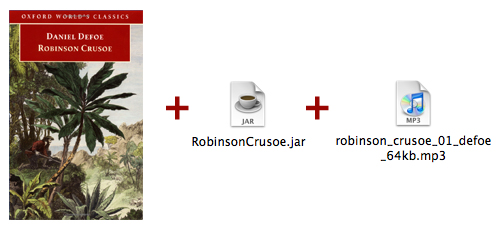
I’m currently reading a book in three formats at once. I’ve got a nice paperback copy for bed and sofa reading. I’ve got an ebook formatted for my mobile phone for tubes and buses. And I’ve got a free audiobook—an MP3 also on my mobile phone—for when I’m cycling along the canal to work in the mornings. (I could also read by email and RSS, if desired).
None of this is perfect. The pbook is an old photostat copy – it was cheap, but it’s poorly set, there are a lot of (uncorrectable) typos and there’s little metacontent (e.g. a good, contextual introduction – a real value-add in pbooks). The ebook is fine but very limited, and I keep pressing the wrong button and skipping to the wrong place (despite now being quoted on their homepage, I’m not an unqualified fan of booksinmyphone). And the audiobook is too quiet and read in a fairly toneless Californian voice, which just doesn’t suit the text. Nevertheless.
What does this tell us? Well, firstly, that the old idea of the ‘book’ as distinct, inviolable, physical entity is well and truly gone – we’ve had ‘audiobooks’ for decades, for starters. Many audiobooks typically outsell the hardback editions of their print counterparts, and while this market has yet to really break through into mp3s, Amazon’s acquisition of Audible and increased iTunes support will change this eventually. The main issue at the moment, as with ebooks, is pricing.
The other thing I think we need to pay more attention to is interoperability (? right word) between formats, because these aren’t going to stop multiplying. I don’t just mean making ebooks platform-independent, I mean building structures that make skipping between formats easy. Yesterday’s proposal contains the germ of this, but really a universally agreed mark-up language for texts to allow direct-linking at a line-by-line level is necessary.
Which isn’t going to happen, of course—imagine creating a mark-up language for all the different versions of Shakespeare’s texts alone—but it’s fun to think about. And possibly create things now that will help.
For electronic version, you could search in the text the last phrase you hear or you read. Most difficult to skip audio to paper of course or paper to audio. ;-)
Comment by Hubert Guillaud — February 20, 2008 @ 6:57 pm